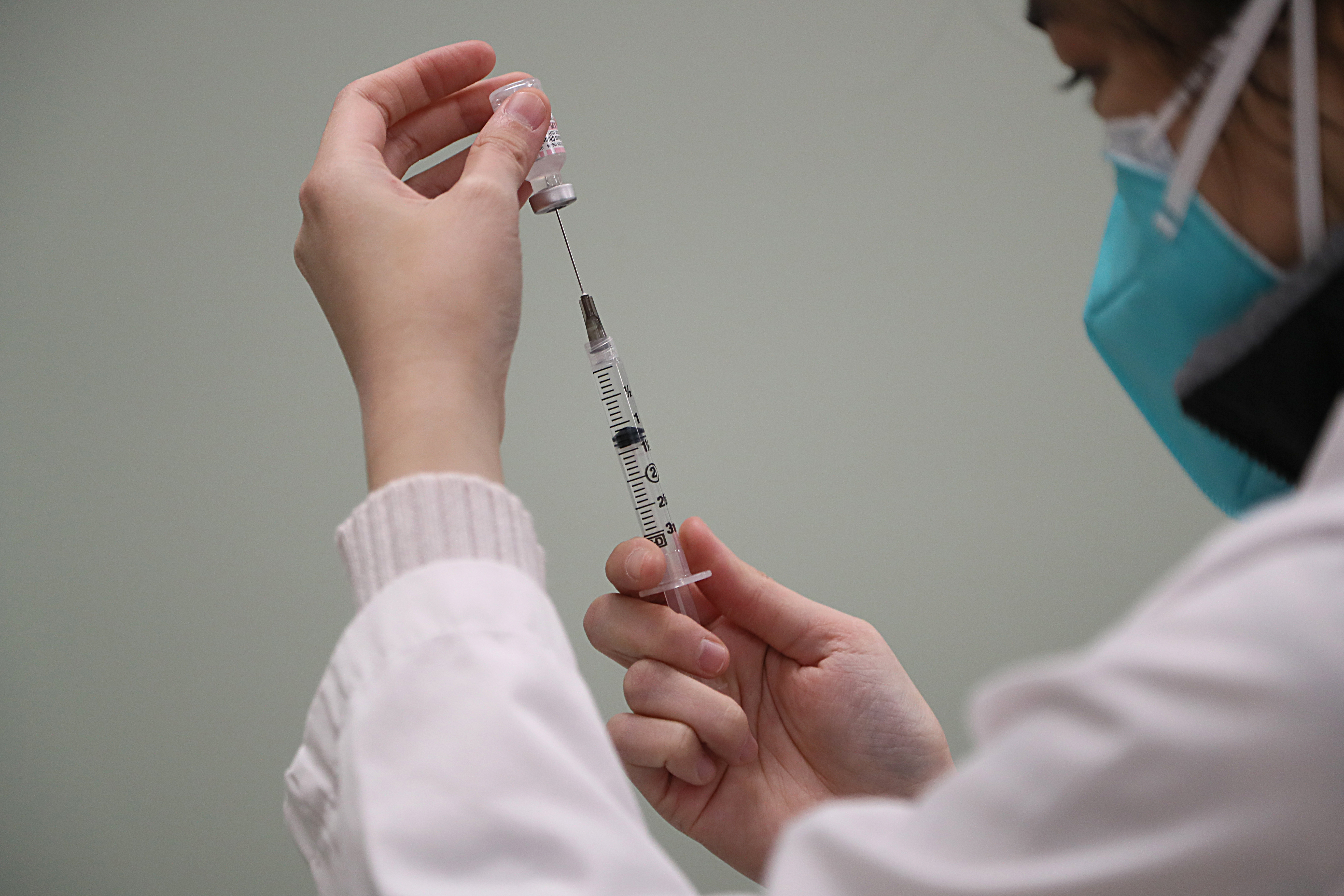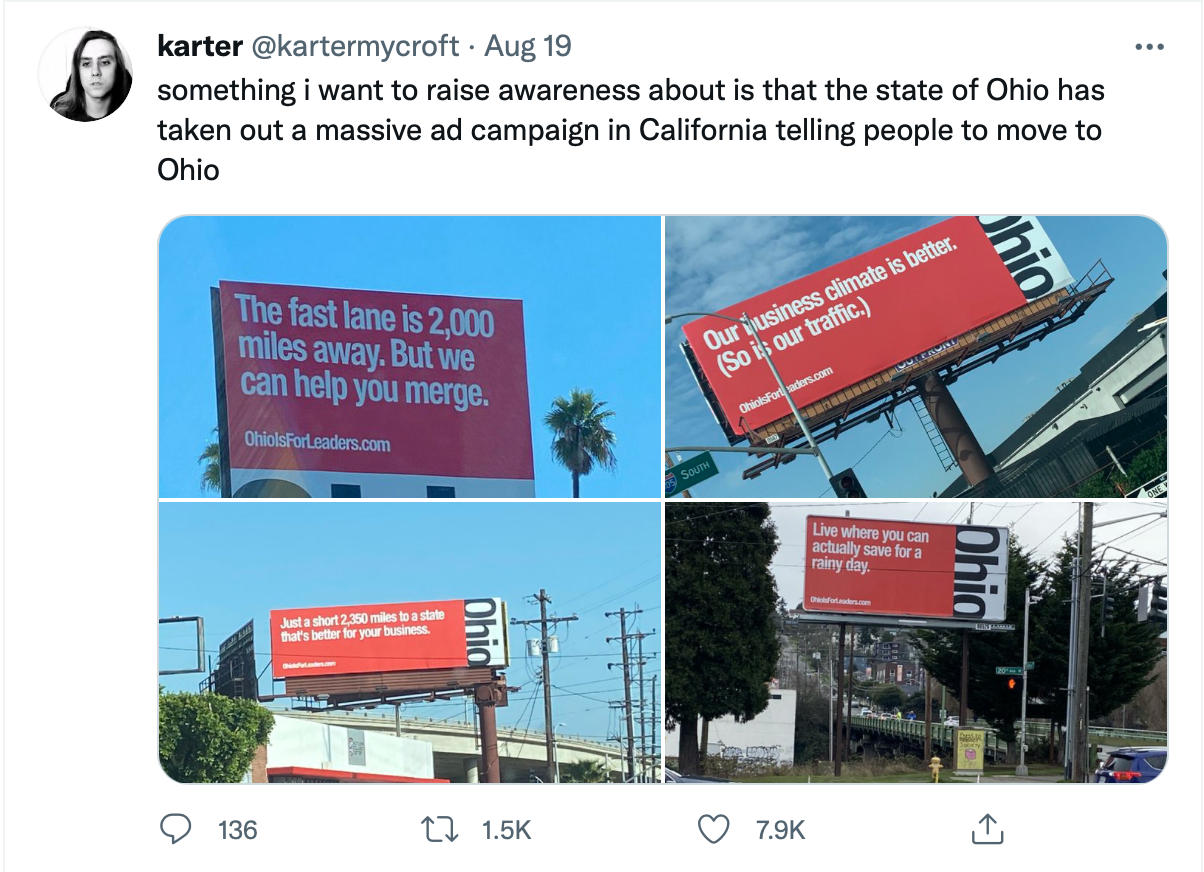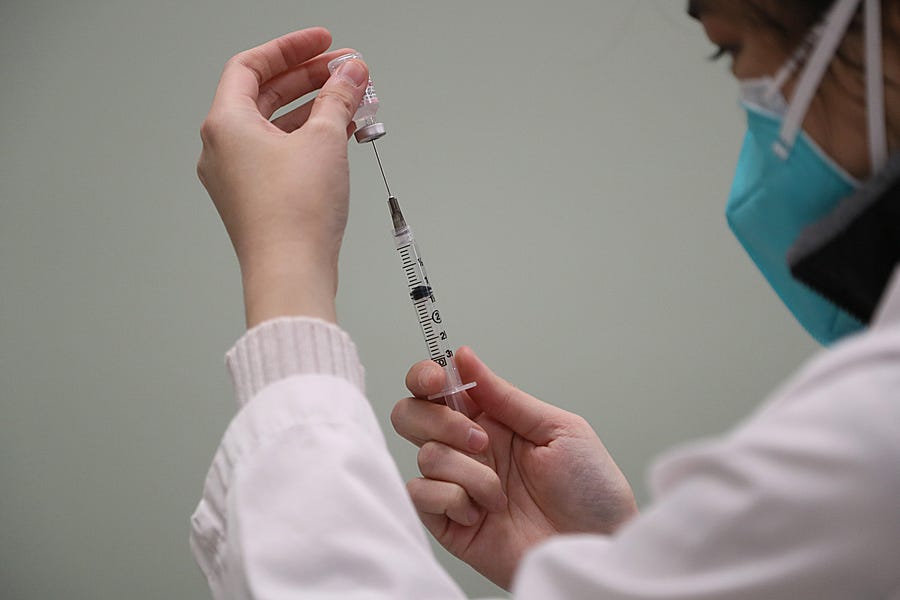Happy Tuesday! A quick correction before we get started. In yesterday’s Quick Hits, we wrote this: “Eighteen commercial aircraft will arrive in Kabul in the coming days to aid in the evacuation effort, the Pentagon said Sunday.” Commercial aircraft are assisting with the evacuation, but as the Pentagon statement we linked made clear, those planes are not flying into Kabul itself; rather, they are being used “for the onward movement of passengers from temporary safe havens and interim staging bases.” We apologize for the error.
Quick Hits: Today’s Top Stories
-
The Food and Drug Administration formally approved the Pfizer-BioNTech COVID-19 vaccine for those 16 and over on Monday, making it the first COVID-19 vaccine to advance past the emergency use authorization in the United States. Regulators granted full approval to the vaccine after reviewing updated clinical trial data from Pfizer showing it to be 91 percent effective at preventing COVID-19 disease.
-
Shortly after full FDA approval was granted, several institutions implemented new—or stricter—vaccine mandates. New York City will now require every Department of Education employee in the city—from principals to custodians—to have at least one COVID-19 vaccine dose by September 27, and the Pentagon reaffirmed Defense Secretary Lloyd Austin’s earlier promise to mandate vaccines for service members “immediately upon” FDA licensure. Pentagon spokesman John Kirby said the Department will provide an updated timeline “in the coming days.”
-
One day after President Joe Biden floated the possibility of extending his administration’s self-imposed August 31 deadline for completing evacuations out of Afghanistan, a Taliban spokesman told Sky News there “would be consequences” for doing so. “If they are intent on continuing the occupation it will provoke a reaction,” he added. The Pentagon said Monday morning the U.S. military had transported just under 11,000 out of Afghanistan over the past 24 hours.
-
German, American, and Afghan troops were involved in a brief firefight at the Kabul Airport on Monday morning that resulted in one Afghan soldier dead and three injured, according to German military officials. Navy Capt. William Urban—spokesman for U.S. Central Command—said an “unknown hostile actor” shot an Afghan soldier, leading Afghan, American, and German forces to return fire in “keeping with their right of self-defense.”
-
A new U.S. Army report released Monday found that the Chinese military has significantly improved its ballistic missile force’s range and accuracy in recent years, with new versions of China’s DF-11 short-range ballistic missile more than doubling their range to beyond 700 kilometers while improving accuracy to within a 30 meter circular error.
-
California Superior Court Judge Frank Roesch ruled over the weekend that Proposition 22—the ballot measure California voters approved last November allowing companies such as Uber, Lyft, and DoorDash to continue classifying their drivers as independent contractors—is unconstitutional. The companies plan to appeal the ruling.
-
The United States Capitol Police announced Monday it had completed an internal investigation into the fatal shooting of January 6 rioter Ashli Babbitt, determining that the conduct of the officer involved was “lawful” and “within Department policy.” The officer will not face internal discipline.
FDA Gives Full Approval to Pfizer Vaccine

Eight months and hundreds of millions of administered doses after the Food and Drug Administration first granted an emergency use authorization (EUA) to Pfizer’s COVID-19 vaccine, the regulating body announced Monday that it had at last granted the pharmaceutical giant’s mRNA shot full approval for Americans 16 and older.
“While this and other vaccines have met the FDA’s rigorous, scientific standards for emergency use authorization, as the first FDA-approved COVID-19 vaccine, the public can be very confident that this vaccine meets the high standards for safety, effectiveness, and manufacturing quality the FDA requires of an approved product,” acting FDA commissioner Janet Woodcock said in a statement. “While millions of people have already safely received COVID-19 vaccines, we recognize that for some, the FDA approval of a vaccine may now instill additional confidence to get vaccinated.”
The vaccine will remain available under EUA for kids ages 12 through 15, as it has been since May.
Critics of the FDA have decried its approval process as dangerously slow, but the less than four months between Pfizer’s formal application in May and final sign off is actually the quickest turnaround in the agency’s history. “The public and medical community can be confident that although we approved this vaccine expeditiously, it was fully in keeping with our existing high standards for vaccines in the U.S.,” said Dr. Peter Marks, director of the FDA’s Center for Biologics Evaluation and Research.
On the consumer end, there isn’t a great deal of difference between EUA and full approval for a vaccine like Pfizer’s. But full approval gives the company the assurance it will be able to continue marketing the drug even after the COVID public health emergency has ended. It also frees Pfizer to begin to promote the vaccine itself using its own brand name—which, to your Morning Dispatchers’ dismay, turns out to be the word “Comirnaty.”
As the relative novelty of the COVID vaccines is frequently cited by the vaccine-hesitant as a rationale for their skepticism, some public health experts are hopeful that the full stamp of FDA approval may convince some waverers to get the shots. Then again, given the titanic amount of public health and political messaging that’s already taken place around the vaccines, it’s also reasonable to wonder whether we’re past the point at which formalities like this will result in a significant sea change.
“I think as a communication intervention, there will be a small number of people for whom this, you know, tips the scales,” Jeff Niederdeppe, a professor of public health communication at Cornell University, told The Dispatch. “But I think broadly speaking there’s a lot more people in the category of general distrust of the FDA as an institution to approve things. Moving from emergency authorization to full authorization, for those folks, I seriously doubt that’s going to make a huge difference.”
That isn’t to say, however, that FDA approval isn’t a significant development in the fight to end the pandemic. More than persuasion, Niederdeppe said, the most immediate impact of full approval may be the signal it sends to private institutions to allow them to move forward more aggressively with vaccine requirements for customers or—more likely—employees.
This indeed seems to be the way things are now trending. On the heels of the FDA’s announcement, the Pentagon confirmed it would soon begin mandating COVID-19 vaccination among all U.S. service members. And Mayor Bill de Blasio’s administration cracked down even further on Department of Education employees in New York City, rescinding its previous alternative to vaccination of regular testing. By September 27, all teachers, custodians, and school administrators in the city must have received at least one COVID shot.
In remarks Monday afternoon, President Biden—whose administration has said it will not support a federal vaccine mandate—urged companies and state governments to take the same step. “If you’re a business leader, a nonprofit leader, a state or local leader who has been waiting for full FDA approval to require vaccinations, I call on you now to do that,” he said. “Do what I did last month—require your employees to get vaccinated or face strict requirements.”
As Biden ratchets up political pressure in support of mandates, it seems a safe bet that an increase in backlash won’t be far behind. As we’ve covered in the past, several GOP-led states have already implemented policies or passed legislation forbidding companies and localities from requiring proof of vaccination for their customers or employees.
“In Florida, your personal choice regarding vaccinations will be protected and no business or government entity will be able to deny you services based on your decision,” Florida Gov. Ron DeSantis said back in May, shortly after he signed one such bill.
The constitutionality of such bills remains unclear, as they have faced successful legal challenges in recent weeks. Earlier this month, a federal judge granted a preliminary injunction to Norwegian Cruise Line to permit it to enforce its vaccine requirement on a cruise out of Miami. Florida is currently appealing that decision.
California Governor’s Recall Election Looms
When we last wrote to you about the ongoing effort to remove Gov. Gavin Newsom from his post, California Republicans had just clinched the 1.5 million signatures required to trigger a recall election. In the six months since, an organized opposition has fielded candidates, mobilized the conservative base, and funneled cash into attack ads targeting the state’s Democratic leadership.
California election officials began sending mail-in ballots to all registered voters in the state on August 16, and Californians have until the official day of the election—September 14—to return them. On the ballot itself, voters will be faced with two questions: Do you want to recall Gov. Newsom, and, if the governor is recalled, with whom do you want to replace him?
A recall is triggered if a majority of voters answer yes to the first question. At that point, whichever candidate receives a plurality of support on the second would assume the governorship. The method lends itself to a situation wherein California’s next governor could be selected by fewer than half the election’s voters, which—given the strange, off-year timing—will likely be an exceedingly slim fraction of the overall electorate. If Newsom is recalled, California’s secretary of state will certify the results on October 22 and the new governor will serve out the remainder of Newsom’s term, which is set to expire on January 2, 2023.
“Republicans are motivated, they’re aware of the election, they have a smaller universe to turn out than Democrats,” said Rob Stutzman, a Republican consultant in California who worked on Arnold Schwarzenegger’s 2003 bid—the only successful recall campaign in California history. “It’s essentially why this election, in a 2:1 Democratic state, is polling so closely. There’s going to be a huge inequity in turnout.”
To improve his chances on the first ballot measure, Newsom and the state’s Democratic Party have discouraged other big name liberals from running as backup candidates, heightening the possibility of a Republican candidate winning with the support of a small fraction of Californians. “We’re just focusing on ‘no’ on the recall, leaving the rest blank,” Newsom said earlier this month. He doubled-down on the strategy in a tweet on Sunday.
Newsom, the former mayor of San Francisco, won the governorship easily in 2018, defeating Republican John Cox by nearly 3 million votes in deep blue California, 62 percent to 38 percent. Does he really need to worry now?
Newsom certainly seems to be taking the threat seriously. He’s fighting in court to classify the recall as a “Republican power grab” in the state’s official voter guide, and sued his own secretary of state in June trying to get a “Democratic Party” label printed next to his name on the ballot after his team forgot to fill out the necessary paperwork earlier this year.* President Biden issued a resounding endorsement of Newsom earlier this month, and Vice President Kamala Harris will rally with Newsom in-person on Friday in an effort to boost Democratic turnout. FiveThirtyEight’s polling average for the race shows Newsom more or less within the margin of error, with an ever-so-slight 1 percent advantage for voters rejecting the recall.
Forty-six candidates in total have joined the race to replace the governor, but only nine of them are Democrats—and those Democrats have very little name recognition or political experience. Of the 24 Republicans vying to replace Newsom (a handful of candidates did not declare party preference), conservative talk show host Larry Elder, former San Diego mayor Kevin Faulconer, aforementioned businessman John Cox, and state legislator Kevin Kiley have gained the most traction. California’s GOP has thus far refrained from endorsing a particular candidate to avoid demobilizing different contingents of the Republican base.
Elder is the “clear frontrunner” among the replacement candidates, Stutzman says. “Entering the field at the last minute, he’s been leading—it appears to be largely through name identification—and he’s been able to parlay that into some pretty good fundraising as well,” he said. “The candidate race is essentially looking like a Republican primary in a deeply blue state, which has been a bit odd to watch.”
Late last week, however, Elder’s ex-fiancée—who is supporting Faulconer in the race—came forward with allegations that the talk show host brandished a gun at her in 2015 while high on marijuana. Elder has categorically denied the claims, but Faulconer and reality-TV star Caitlyn Jenner—whose much-ballyhooed campaign to replace Newsom is struggling—called on him to drop out of the race. A handful of the candidates are slated to participate in a debate tomorrow night.
What case will these Republican candidates try to make against Newsom? The COVID-19 crisis in California and the state’s strict lockdowns and stay-at-home orders—along with Newsom’s failure to adhere to them in his personal life—earned the recall movement supporters from across the ideological spectrum. As the virus’ Delta variant flares across the Golden State, the threat of a return to last year’s restrictions could mobilize California’s Republicans.
But COVID is far from the only driving force: Longstanding problems including drug-use, homelessness, and income inequalities also factor into the effort to replace Newsom.
“I think a moderate would have an opportunity to make some progress, particularly on homelessness and issues related to crime,” Stutzman noted. “I think there are probably Democrats who are kicking themselves that they didn’t make the move on the recall, because they probably would have had an excellent chance of prevailing. We have seen polling that shows the majority of Democrats would prefer to have another option.”
Worth Your Time
-
Much has been written already about JD Vance’s quixotic bid to represent Ohio in the U.S. Senate next year, but this piece—from James Pogue in The American Conservative—might be the best. Pogue is on the political left, but he’s also from the same kind of down-on-its-luck rural Ohio town that Vance detailed in his bestselling book Hillbilly Elegy—and in theory is someone Vance would want to represent. “I asked him if there was some version of his project that didn’t have to be exclusionary,” Pogue writes. “I was surprised when he used the word right back at me. ‘I think that any national project has to be on some level exclusionary,’ [Vance] said. He talked about it as a foregone conclusion that the only way left to have a sense of cultural grounding in America was to wear it as an oppositional identity, against an elite that I still wasn’t sure the makeup of.”
-
Two years ago last month, Los Angeles Angels pitcher Tyler Skaggs died in his hotel room after choking on his own vomit with a mix of alcohol, fentanyl, and oxycodone in his system. One year later, erstwhile Angels media relations staffer Eric Kay was arrested and charged with distributing the fentanyl that killed the 27-year-old pitcher. In a piece for League of Justice—a publication that covers the intersection of sports and the law—Amy Dash reports that prosecutors have evidence showing a drug dealer delivered the fatal pills to Angels Stadium the same day of Skaggs’ overdose, and that Kay was “running a drug distribution operation within the Angels organization” that provided illegal opioids to “at least six” Angels players. Tens of millions of dollars are at stake, as Skaggs’ family seeks to hold the organization civilly liable for the pitcher’s death. “The family says the Angels are aware of the ‘rigors of a 162 -game schedule and are aware that players are at risk of turning to medication to assist with pain management,’” Dash writes. “The Skaggs’ suit accuses the Angels of creating ‘the perfect storm,’ by employing an alleged drug addict and distributor.”
-
The FDA granted full approval to the Pfizer-BioNTech COVID-19 vaccine on Monday, but Conor Friedersdorf argues in The Atlantic that U.S. regulators’ overly cautious approach to risk during the pandemic has cost far more lives than it’s saved. “Each time a new weapon emerges in the fight against a deadly disease, the bureaucrats charged with judging its safety and efficacy face a trade-off: Proceed too quickly and a dangerous or useless drug or medical device might be granted approval; proceed too slowly and the sick and dying might be denied a lifesaving intervention,” he writes. “But public-health officials operate under incentives that distort their judgment. If they approve a drug or medical device that hurts even a tiny number of people, or that proves ineffective, the harms are clear, and those responsible may be pilloried in the press as negligent or corrupt. When the bureaucracy moves too slowly, the harms are harder to see. As the economist Alex Tabarrok put it in 2015, people still die, but ‘the bodies are buried in an invisible graveyard.’”
Presented Without Comment
Also Presented Without Comment

Toeing the Company Line
-
On Monday’s Advisory Opinions, Sarah and David are joined by University of Pennsylvania law professor Mitchell Berman for a discussion of the jurisprudence of sports. How are unwritten rules baked into athletics? Are robot umpires coming? And is anything about the Olympics legal?
Let Us Know
Trying out a new question format here: Which Quick Hit from today’s TMD do you think will end up being the most significant in the long run?
Reporting by Declan Garvey (@declanpgarvey), Andrew Egger (@EggerDC), Charlotte Lawson (@charlotteUVA), Ryan Brown (@RyanP_Brown), Harvest Prude (@HarvestPrude), and Steve Hayes (@stephenfhayes).
Clarification, August 24, 2021: Fixed a grammatical error.







Please note that we at The Dispatch hold ourselves, our work, and our commenters to a higher standard than other places on the internet. We welcome comments that foster genuine debate or discussion—including comments critical of us or our work—but responses that include ad hominem attacks on fellow Dispatch members or are intended to stoke fear and anger may be moderated.